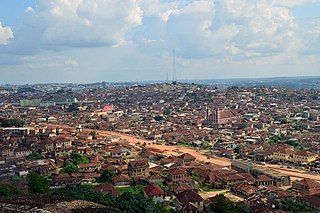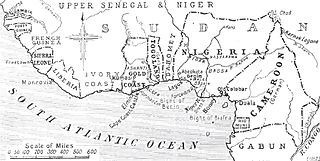Related Research Articles

The Scramble for Africa, also called the Partition of Africa, or the Conquest of Africa, was the invasion, annexation, division, and colonization of most of Africa by seven Western European powers during a short period known as New Imperialism. The 10 percent of Africa that was under formal European control in 1870 increased to almost 90 percent by 1914, with only Ethiopia (Abyssinia) and Liberia remaining independent, though Ethiopia would later be invaded and occupied by Italy from 1936 to 1941.
EUG may refer to:

The Egba people are a subgroup of the Yoruba people, an ethnic group of western Nigeria, a majority of whom are from the central part of Ogun State that is Ogun Central Senatorial District.

Abeokuta is the state capital of Ogun State in southwest Nigeria. It is situated on the east bank of the Ogun River, near a group of rocky outcrops in a wooded savanna; 77 kilometres (48 mi) north of Lagos by railway, or 130 kilometres (81 mi) by water. As of 2006, Abeokuta and the surrounding area had a population of 449,088.
Ijoko is a town in Sango /Ijoko Local Council Development Area of Ogun State, Western Nigeria, located north of Lagos and south of Abeokuta.

Sir Gilbert Thomas Carter was an administrative officer in the Royal Navy and a colonial official for the British Empire.
Egba Ake, otherwise known as Egba Alake, is one of the five sections of Egbaland, the others being Oke-Ona, Gbagura, the Owu and Ibara. It is a traditional state which joins with its bordering sections to form something of a high kingship. The Alake of Abeokuta, or Alake of Egbaland, is the traditional ruler of the Egba clan of Yoruba in the city of Abeokuta in southwestern Nigeria.

Lagos Colony was a British colonial possession centred on the port of Lagos in what is now southern Nigeria. Lagos was annexed on 6 August 1861 under the threat of force by Commander Beddingfield of HMS Prometheus who was accompanied by the Acting British Consul, William McCoskry. Oba Dosunmu of Lagos resisted the cession for 11 days while facing the threat of violence on Lagos and its people, but capitulated and signed the Lagos Treaty of Cession. Lagos was declared a colony on 5 March 1862. By 1872, Lagos was a cosmopolitan trading center with a population over 60,000. In the aftermath of prolonged wars between the mainland Yoruba states, the colony established a protectorate over most of Yorubaland between 1890 and 1897. The protectorate was incorporated into the new Southern Nigeria Protectorate in February 1906, and Lagos became the capital of the Protectorate of Nigeria in January 1914. Since then, Lagos has grown to become the largest city in West Africa, with an estimated metropolitan population of over 9,000,000 as of 2011.
The Abeokuta Women's Revolt was a resistance movement led by the Abeokuta Women's Union (AWU) in the late 1940s against the imposition of unfair taxation by the Nigerian colonial government. The women of Abeokuta believed that, under colonialism, their economic roles were declining, while their taxes were increasing. Additionally, they argued that until they were granted representation in local government, they should not be required to pay taxes separately from men. As a result of their protests, four women received seats on the local council, and the taxation of women was ended.

The Adubi War was a conflict in June and July 1918 in the British Colony and Protectorate of Nigeria ostensibly because of the imposition of colonial taxation. Direct taxes were introduced by the colonial government along with existing forced labour obligations and fees. On 7 June, the British arrested 70 Egba chiefs and issued an ultimatum that resisters should lay down their arms, pay the taxes and obey the local leadership.
The 1908 Birthday Honours for the British Empire were announced on 28 June, to celebrate the birthday of Edward VII.
The 1914 Birthday Honours were appointments in the British Empire of King George V to various orders and honours to reward and highlight good works by citizens. The appointments were made to celebrate the official birthday of The King, and were published on 19 June 1914.
The New Year Honours 1911 were appointments by King George V to various orders and honours to reward and highlight good works by members of the British Empire. They were announced on 3 January 1911.
The 1924 New Year Honours were appointments by King George V to various orders and honours to reward and highlight good works by members of the British Empire. They were published in The London Gazette on 1 January 1924.

The Saro, or Nigerian Creoles of the nineteenth and early twentieth centuries, were formerly enslaved people who migrated to Nigeria in the beginning of the 1830s. They were known locally as Saro(elided form of Sierra Leone, from the Yoruba sàró). A related community of people were likewise known as Amaro, and were migrants from Brazil and Cuba.
The 1926 Birthday Honours were appointments by King George V to various orders and honours to reward and highlight good works by citizens of the British Empire. The appointments were made to celebrate the official birthday of The King on 3 June, but it was announced on 20 May that due to the national strike, the King had approved the Prime Minister's recommendation to delay the publication of the list until 3 July 1926. The honours were effective to 5 June 1926. Per standard practice, Sir Paul Chater, who died 27 May 1926, still received the honour of Knight Commander of the Order of the British Empire as he would have received the honour if he had survived.
The 1936 New Year Honours were appointments by King George V to various orders and honours to reward and highlight good works by citizens of the United Kingdom and British Empire. They were announced on 31 December 1935.
The 1924 Birthday Honours were appointments by King George V to various orders and honours to reward and highlight good works by citizens of the British Empire. The appointments were made to celebrate the official birthday of The King, and were published in The London Gazette on 3 June 1924.
The Iyalode is a high-ranking female chieftain in most of the Yoruba traditional states. The title is currently within the gift of the obas, although Njoku asserted in 2002 that the process of choosing an Iyalode in pre-colonial Nigeria was less of a choice by the monarch, and more of the accomplishment and involvement of the woman to be so honoured in economic and political matters.
Egba Gbagura is one of the five sections of Egbaland, the others being Ake, Oke-Ona, the Owu and Ibara. It is a traditional state which joins with its bordering sections to form something of a high kingship.
References
Canby, Courtlandt. The Encyclopedia of Historic Places. (New York: Facts of File Publicantions, 1984) p. 2